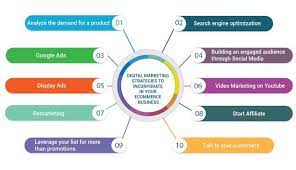The Power of Ecommerce Digital Marketing Strategy
In today’s digital age, having a strong ecommerce digital marketing strategy is essential for online businesses to thrive and succeed. With the increasing competition in the ecommerce industry, it’s crucial to stand out from the crowd and effectively reach your target audience.
Understanding Your Audience
One of the key elements of a successful ecommerce digital marketing strategy is understanding your target audience. By identifying their preferences, behaviours, and needs, you can tailor your marketing efforts to resonate with them effectively. Utilise data analytics tools to gather insights and create targeted campaigns that drive engagement and conversions.
Optimising Your Website
Your ecommerce website is the cornerstone of your online presence. Ensure that it is user-friendly, visually appealing, and optimised for search engines. Implementing SEO best practices, such as using relevant keywords, creating high-quality content, and improving site speed, can significantly enhance your website’s visibility and attract organic traffic.
Social Media Marketing
Social media platforms offer a valuable opportunity to connect with your audience on a more personal level. Develop a strong social media marketing strategy that includes engaging content, targeted advertising, and regular interaction with followers. Leverage social media channels to showcase your products, run promotions, and build brand loyalty.
Email Marketing Campaigns
Email marketing remains one of the most effective tools for driving sales and nurturing customer relationships. Create personalised email campaigns that deliver relevant content based on customer preferences and behaviours. Use email automation tools to send targeted messages at the right time to maximise engagement and conversions.
Measuring Performance
Monitoring and analysing the performance of your ecommerce digital marketing efforts is essential for continuous improvement. Track key metrics such as website traffic, conversion rates, click-through rates, and ROI to evaluate the effectiveness of your strategies. Use this data to make informed decisions and optimise your campaigns for better results.
Conclusion
A well-crafted ecommerce digital marketing strategy can propel your online business towards success by increasing brand awareness, driving traffic, generating leads, and ultimately boosting sales. By leveraging various digital marketing tactics strategically and adapting to changing trends, you can stay ahead in the competitive ecommerce landscape.
Top 5 FAQs on Enhancing Your Ecommerce Digital Marketing Strategy
- What is ecommerce digital marketing strategy?
- How can I improve my ecommerce website for better digital marketing?
- What role does social media play in ecommerce digital marketing?
- Why is email marketing important for ecommerce businesses?
- How do I measure the success of my ecommerce digital marketing strategy?
What is ecommerce digital marketing strategy?
An ecommerce digital marketing strategy refers to a comprehensive plan that online businesses implement to promote their products or services, attract customers, and drive sales through digital channels. This strategic approach involves utilising various online marketing tactics such as search engine optimisation (SEO), social media marketing, email campaigns, content marketing, and paid advertising to reach and engage with target audiences effectively. By strategically combining these digital marketing elements, businesses can enhance their online visibility, build brand awareness, increase website traffic, and ultimately boost conversions and revenue in the competitive ecommerce landscape.
How can I improve my ecommerce website for better digital marketing?
To improve your ecommerce website for better digital marketing, focus on enhancing user experience, optimising for search engines, and implementing effective conversion strategies. Start by ensuring that your website is user-friendly, visually appealing, and easy to navigate. Conduct usability tests to identify any pain points and make necessary improvements. Optimise your website for search engines by using relevant keywords, creating high-quality content, and building backlinks to increase visibility. Implement conversion rate optimisation techniques such as clear call-to-action buttons, streamlined checkout processes, and personalised product recommendations to encourage visitors to make purchases. Regularly analyse data and metrics to identify areas for improvement and refine your digital marketing strategies accordingly.
What role does social media play in ecommerce digital marketing?
Social media plays a pivotal role in ecommerce digital marketing by providing a platform for businesses to engage with their target audience, build brand awareness, drive traffic to their websites, and ultimately increase sales. Through strategic social media marketing efforts, businesses can showcase their products or services, run targeted advertising campaigns, and foster meaningful relationships with customers. Social media platforms offer valuable opportunities for direct communication, customer feedback, and user-generated content that can enhance brand credibility and loyalty. By leveraging the power of social media channels effectively, ecommerce businesses can amplify their reach, connect with potential customers on a personal level, and stay competitive in the digital marketplace.
Why is email marketing important for ecommerce businesses?
Email marketing plays a pivotal role in the success of ecommerce businesses for several reasons. It allows businesses to directly reach out to their target audience with personalised and relevant content, nurturing customer relationships and building brand loyalty. With email marketing, ecommerce businesses can promote products, announce sales or special offers, and engage customers through tailored messages that drive traffic to their website and ultimately boost sales. Additionally, email marketing provides a cost-effective way to communicate with customers, track performance metrics, and gather valuable insights for refining future marketing strategies. In essence, email marketing is a powerful tool that enables ecommerce businesses to connect with their audience effectively and drive conversions in a competitive online landscape.
How do I measure the success of my ecommerce digital marketing strategy?
Measuring the success of your ecommerce digital marketing strategy is crucial to understanding its impact and effectiveness. Key performance indicators (KPIs) such as website traffic, conversion rates, customer acquisition cost, return on investment (ROI), and customer lifetime value provide valuable insights into the performance of your campaigns. By analysing these metrics regularly and comparing them against your predefined goals, you can determine the success of your strategy and identify areas for improvement. Additionally, tracking engagement metrics like click-through rates, bounce rates, and social media interactions can help you gauge how well your audience is responding to your marketing efforts. Continuous monitoring and analysis of these metrics allow you to make data-driven decisions and optimise your ecommerce digital marketing strategy for better results.


